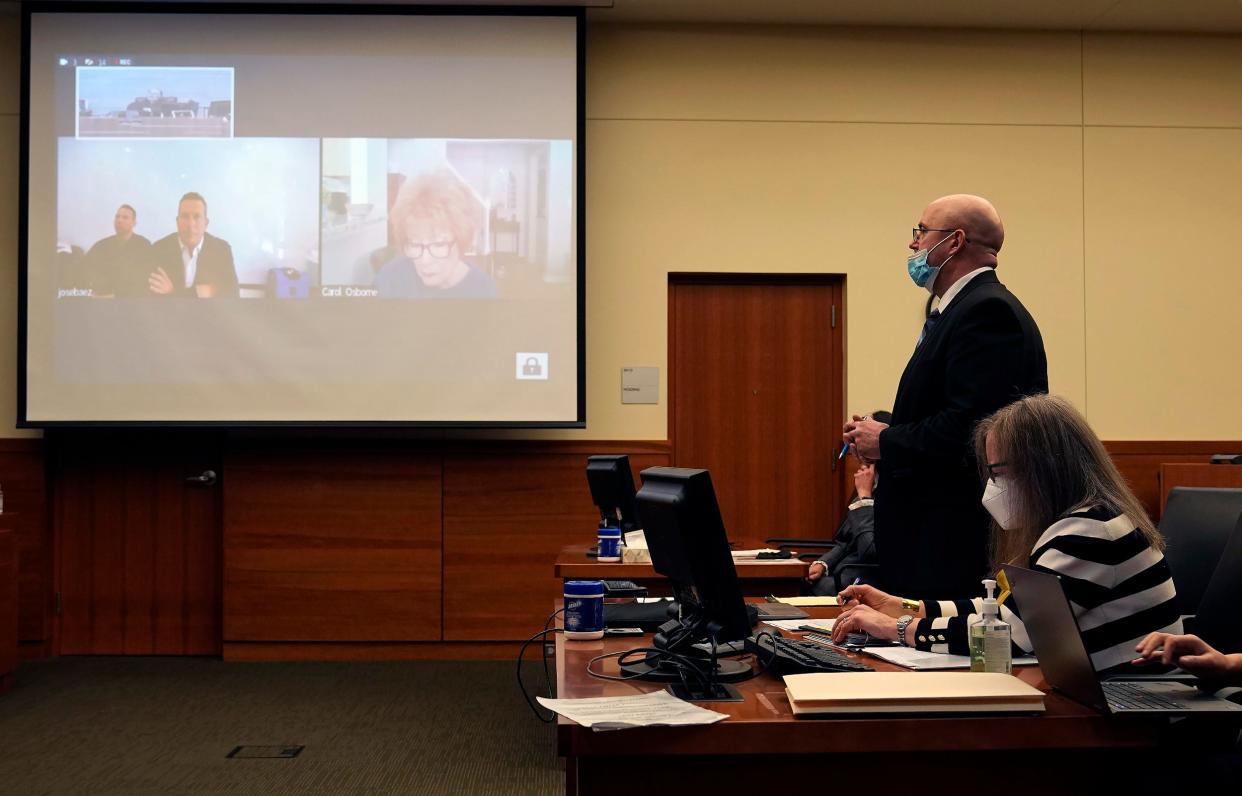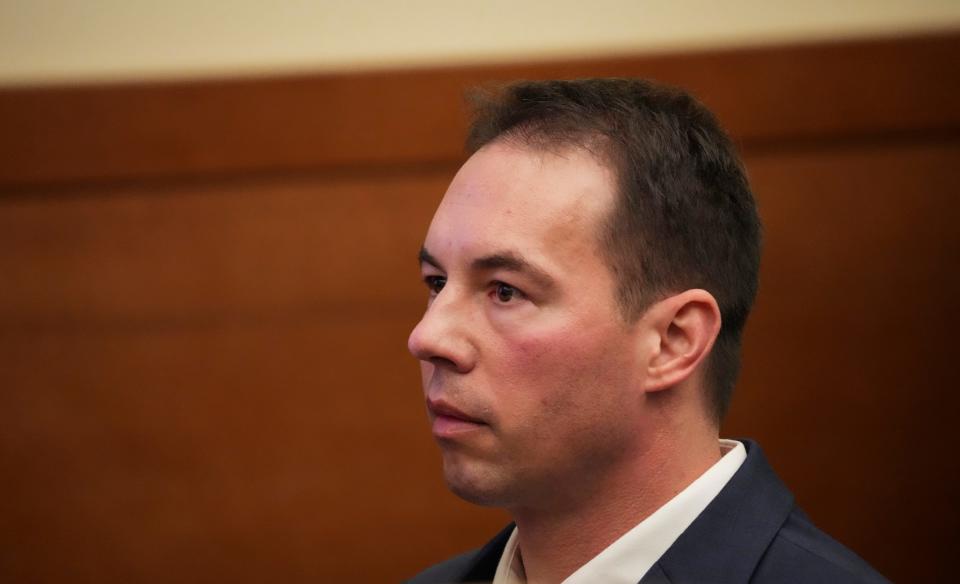Here are the 11 murder charges against former Dr. William Husel that a judge approved dropping

A Franklin County judge on Thursday approved a request by county prosecutors to drop 11 of 25 murder counts against former intensive-care physician William Husel in an effort to streamline the case against a man accused of purposely killing critically ill patients with overdoses of the powerful opioid fentanyl at Mount Carmel Health hospitals.
Common Pleas Judge Michael J. Holbrook issued the ruling without comment after hearing statements in private from some of the family members of victims whose cases were to be dropped.
Victims, or their family members, must be given the chance to comment under provisions of Marsy's Law, a victim's-rights amendment to the Ohio Constitution, approved by Ohio voters in 2017.
The proposed dismissals eliminated murder counts charging Husel with causing the deaths of Emma Bogan, Jan Marlene Thomas, Norma J. Welch, Timothy Fitzpatrick, Michael Walters, Robert P. Lee, Thomas Matthews, Larry Brigner, Janet Kavanaugh, Charles Longstreth and Corrinnia Blake.
After the hearing, First Assistant Prosecutor Janet Grubb declined to comment on the reasons for the dismissals.
But one year ago, shortly after taking office, county Prosecutor Gary Tyack told The Dispatch that he favored dismissing some of the counts against Husel and proceeding "with a small number of cases."
His reasoning was that it was a waste of time and resources "to incarcerate a man for more lifetimes than he has." If convicted, each murder count carries a mandatory sentence of life in prison with no chance of parole for 15 years.
Assistant Prosecutor David Zeyen suggested to the judge at the beginning of the hearing that family comments about dismissals be made in private out of concerns that making the remarks publicly could taint the jury pool for the trial, which is scheduled to begin next month.
The judge asked if the media present would be willing to not report specifics of what family members of victims had to say if their comments were heard in the courtroom. A Dispatch reporter told the judge that the newspaper could not agree to withhold victim statements that are made publicly in open court.
The judge ruled that those who wanted to speak could do so in private, some via video, and temporarily recessed the hearing so he could hear their comments in an adjacent conference room.

After his ruling, the judge said he spoke with one family member in person and four via video and read letters submitted by two others.
A Franklin County grand jury indicted Husel in June 2019 on charges that he intentionally killed 25 intensive-care patients at Mount Carmel Health hospitals from February 2015 through November 2018 by prescribing each of them at least 500 micrograms of fentanyl.
Based on the cases dismissed, it now appears that prosecutors are focusing on cases in which patients died after receiving at least 1,000 micrograms of fentanyl.
Husel's defense team contends that he was providing comfort care to terminally ill patients in their final hours and not attempting to shorten their lives.
Husel, 46, and defense attorney Jose Baez attended the hearing through a video link from Miami. Husel, who did not speak, has been free on $1 million bond since shortly after his arrest.
The circumstances of death for the 11 victims whose cases were dismissed (based on civil lawsuits, death certificates and Ohio Board of Nursing documents):
• Emma Bogan, 75, of the Far West Side, died at 1:07 a.m. on Feb. 11, 2015, two minutes after she was given 400 micrograms of fentanyl and 4 milligrams of Versed. She was taken to the hospital on Feb. 10 with septic shock. Medical records indicate that a doctor explained the grave situation to family members and they decided to take her off the ventilator.
• Jan Marlene Thomas, 65, of the Far West Side, arrived in respiratory arrest on Feb. 28, 2015, and was diagnosed with multi-embolic stroke. She was given 800 micrograms of fentanyl at 12:11 a.m. March 1 and died at 12:42 a.m. Medical records indicate her family had asked that she be removed from the ventilator.
• Norma J. Welch, 85, of the South Side, was admitted April 30, 2015, for progressive weakness after a fall. She was given 500 micrograms of fentanyl at 11:57 May 3, then 400 micrograms of fentanyl at 12:10 May 4. She died 20 minutes later. Her family arrived at 12:05 a.m., between doses.
• Timothy Fitzpatrick, 55, of Downtown, arrived Sept. 30, 2017, with suspected chronic heart failure. Medical records indicate that Husel ordered 1,000 micrograms of fentanyl on Oct. 9, but the pharmacist mentioned the fentanyl shortage and the doctor agreed to 500 micrograms. He was given the drug at 9:03 p.m. and died at 9:10.
• Michael Walters, 57, was admitted Oct. 6, 2017, with acute brain swelling and respiratory failure. The family was encouraged to change his status to "do not resuscitate" and agreed. He was given 500 micrograms of fentanyl at 4:11 a.m. Oct. 11, and died eight minutes later.
• Robert P. Lee, 70, of Upper Sandusky — the one patient who died at Mount Carmel St. Ann's Hospital — arrived there Oct. 12, 2017, in cardiac arrest. Medical records indicated that a conversation was held with his spouse, who agreed not to have him resuscitated if his heart stopped. Lee was given 500 micrograms of fentanyl at 8:01 a.m. Oct. 13 and died at 8:20 p.m.
• Thomas Mathews, 61, of Columbus, was admitted Nov. 12, 2017, due to sepsis. He was given 500 micrograms of fentanyl at 8:28 p.m. Nov. 20 and died at 10:40 p.m.
• Larry Brigner, 70, of the South Side, was admitted Dec. 10, 2017, due to an altered mental state related to a history of cancer. A doctor's note said he discussed Brigner's prognosis, and the family decided to withdraw care. He was given 500 micrograms of fentanyl and 4 milligrams of Versed at 10:36 p.m. and died 5 minutes later.
• Janet Kavanaugh, 79, of Grove City, arrived Nov. 25, 2017, with weakness and confusion. She was admitted to the intensive-care unit in cardiac arrest. Medical records indicate her family decided to withdraw care. She was given 1,000 micrograms of fentanyl at 5:45 a.m. and died at 6:03 a.m.
• Charles Longstreth, 67, of Newark, arrived March 23, 2018, in cardiac arrest. On March 25, he received 6 milligrams of Versed at 9:29 p.m. and 500 micrograms of fentanyl at 9:30 p.m. He died at 9:45 p.m.
• Corrinnia Blake, 55, of Marysville, arrived Sept. 17, 2018, with abdominal pain and fever. She was given 500 micrograms of fentanyl and 6 milligrams of Versed at 8:25 p.m. Sept. 25 and died an hour later.
Husel's medical license was suspended by the State Medical Board of Ohio after his indictment, and he allowed it to expire without renewal.
Jury selection for Husel's trial is scheduled to begin with groups of 325 potential jurors summoned to appear either Feb. 2, 3 or 4 to fill out questionnaires about their knowledge of the case and whether they would be available for a weeks-long trial that is scheduled to begin on Feb. 14.
jfutty@dispatch.com
@johnfutty
This article originally appeared on The Columbus Dispatch: Nearly half of murder counts against former doctor Husel are dismissed

